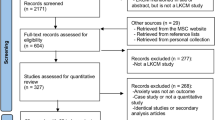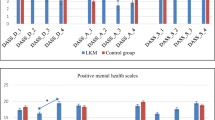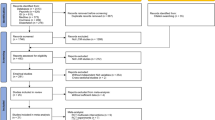Abstract
Although loving-kindness meditation (LKM) has shown some promise as a psychological intervention, little is known about the effectiveness of LKM for reducing one of the most prevalent mental health problems: anxiety. To build knowledge in this area, we conducted a randomized controlled trial, assigning non-clinical undergraduates to either a four-session, group-based LKM intervention (n = 38) or a waitlist control (n = 33). Self-reported anxiety, compassionate love, and self-compassion were assessed at pretreatment, posttreatment, and 8-week follow-up. Relative to control participants, participants in the LKM intervention reported higher compassionate love and self-compassion at posttreatment and higher self-kindness (a component of self-compassion) at follow-up. Anxiety ratings did not significantly differ between conditions at posttreatment or follow-up. Study limitations and directions for future research are discussed.

Similar content being viewed by others
References
Abramowitz, J. S., & Deacon, B. J. (2006). Psychometric properties and construct validity of the obsessive-compulsive inventory-revised: replication and extension with a clinical sample. Anxiety Disorders, 20, 1016–1035.
Brown, T. A., Chorpita, B. F., & Barlow, D. H. (1998). Structural relationships among dimensions of the DSM-IV anxiety and mood disorders and dimensions of negative affect, positive affect, and autonomic arousal. Journal of Abnormal Psychology, 107, 179–192.
Cohen, J. (1988). Statistical power analysis for the behavioral sciences. Hillsdale, NJ: Lawrence Earlbaum Associates.
Desbordes, G., Negi, L. T., Pace, T. W. W., Wallace, B. A., Raison, C. L., & Schwartz, E. L. (2012). Effects of mindful-attention and compassion meditation training on amygdala response to emotional stimuli in an ordinary, non-meditative state. Frontiers in Human Neuroscience. doi:10.3389/fnhum.2012.00292.
Fidell, L., & Tabachnick, B. (2003). Preparatory data analysis. Hoboken, NJ: John Wiley & Sons.
Ferreira, C., Matos, M., Duarte, C., & Pinto-Gouveia, J. (2014). Shame memories and eating psychopathology: the buffering effect of self-compassion. European Eating Disorders Review: The Journal of the Eating Disorders Association, 22, 487–494.
Galante, J., Galante, I., Bekkers, M. J., & Gallacher, J. (2014). Effect of kindness-based meditation on health and well-being: a systematic review and meta-analysis. Journal of Consulting and Clinical Psychology, 82, 1101–1114.
Gyatso, T. (2001). The compassionate life. Boston, MA: Wisdom Publications.
Gilbert, P., & Procter, S. (2006). Compassionate mind training for people with high shame and self-criticism: overview and pilot study of a group therapy approach. Clinical Psychology & Psychotherapy, 13, 353–379.
Goss, K., & Allan, S. (2010). Compassion focused therapy for eating disorders. International Journal of Cognitive Therapy, 2, 141–158.
Grant, B. F., Stinson, F. S., Dawson, D. A., Chou, S. P., Dufour, M. C., Pickering, R. P., & Kaplan, K. (2004). Prevalence and co-occurrence of substance use disorders and independent mood and anxiety disorders: results from the national epidemiologic survey on alcohol and related conditions. Archives of General Psychiatry, 61, 807–816.
Hanh, T. N. (1976). The miracle of mindfulness. Boston, MA: Beacon Press Books.
Hofmann, S. G., Grossman, P., & Hinton, D. E. (2011). Loving-kindness and compassion meditation: potential for psychological interventions. Clinical Psychology Review, 31, 1126–1132.
Hutcherson, C. A., Seppala, E. M., & Gross, J. J. (2008). Loving-kindness meditation increases social connectedness. Emotion, 5, 720–724.
Julian, L. J. (2011). Measures of anxiety; State-Trait Anxiety Inventory (STAI), Beck Anxiety Inventory (BAI), and Hospital Anxiety and Depression Scale-Anxiety (HADS-A). Arthritis Care & Research, 63, S467–S472.
Kabat-Zinn, J. (1994). Wherever you go, there you are: mindfulness meditation in everyday life. New York, NY: Hyperion.
Kornfield, J. (1993). A path with heart: a guide through the perils and promises of spiritual life. New York, NY: Bantam Books.
Kornfield, J. (2002). The art of forgiveness, lovingkindness, and peace. New York, NY: Bantam Books.
Linehan, M. M. (1993). Cognitive-behavioral treatment of borderline personality disorder. New York, NY: Guilford Press.
McClintock, A. S., Anderson, T., & Cranston, S. (2015). Mindfulness therapy for maladaptive interpersonal dependency: a preliminary randomized controlled trial. Behavior Therapy, 46, 856–868.
Morris, S. B., & DeShon, R. P. (2002). Combining effect size estimates in meta-analysis with repeated measures and independent-groups designs. Psychological Methods, 7, 105–125.
Neff, K. D. (2003). The development and validation of a scale to measure self-compassion. Self and Identity, 2, 223–250.
Neff, K. D. (2015). The self-compassion scale is a valid and theoretically coherent measure of self-compassion. Mindfulness, 1–11.
Neff, K. D., & Germer, C. K. (2012). A pilot study and randomized controlled trial of the mindful self-compassion program. Journal of Clinical Psychology, 69, 28–44.
Preacher, K. J., & Hayes, A. F. (2004). SPSS and SAS procedures for estimating indirect effects in simple mediation models. Behavior Research Methods, Instruments, & Computers, 36, 717–731.
Salzberg, S. (1995). Lovingkindness: the revolutionary art of happiness. Boston, MA: Shambhala.
Shahar, B., Szsepsnewol, O., Zilcha-Mano, S., Haim, N., Zamir, O., Levi-Yeshuvi, S., & Levit-Binnun, N. (2014). A wait-list randomized controlled trial of loving-kindness meditation programme for self-criticism. Clinical Psychology & Psychotherapy, 22, 346–356.
Shonin, E., Gordon, W. V., Compare, A., Zangeneh, M., & Griffiths, M. D. (2015). Buddhist-derived loving-kindness and compassion meditation for the treatment of psychopathology: a systematic review. Mindfulness, 6, 1161–1180.
Spielberger, C. D., Gorsuch, R. L., Lushene, R., Vagg, P. R., & Jacobs, G. A. (1983). Manual for the State-Trait Anxiety Inventory. Palo Alto, CA: Consulting Psychologists Press.
Sprecher, S., & Fehr, B. (2005). Compassionate love for close others and humanity. Journal of Social and Personal Relationships, 22, 629–651.
Vettese, L. C., Toneatto, T., Stea, J., Nguyen, L., & Wang, J. J. (2009). Do mindfulness meditation participants do their homework? And does it make a difference? A review of the empirical evidence. Journal of Cognitive Psychotherapy, 23, 198–225.
Werner, K. H., Jazaieri, H., Goldin, P. R., Ziv, M., Heimberg, R. G., & Gross, J. J. (2012). Self-compassion and social anxiety disorder. Anxiety, Stress, & Coping, 25, 543–558.
Author information
Authors and Affiliations
Corresponding author
Ethics declarations
Funding
This study was not externally funded.
Conflict of interest
The authors declare that they have no conflict of interest.
Ethical approval
All procedures performed in studies involving human participates were in accordance with the ethical standards of the institutional and/or national research committee and with the 1964 Helsinki Declaration and its later amendments or comparable ethical standards.
Informed consent
Informed consent was obtained from all individual participants included in the study.
Rights and permissions
About this article
Cite this article
Weibel, D.T., McClintock, A.S. & Anderson, T. Does Loving-Kindness Meditation Reduce Anxiety? Results from a Randomized Controlled Trial. Mindfulness 8, 565–571 (2017). https://doi.org/10.1007/s12671-016-0630-9
Published:
Issue Date:
DOI: https://doi.org/10.1007/s12671-016-0630-9




